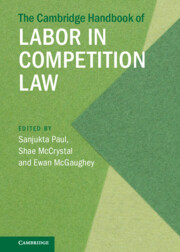Book contents
- The Cambridge Handbook of Labor in Competition Law
- The Cambridge Handbook of Labor in Competition Law
- Copyright page
- Contents
- Contributors
- Preface
- 1 Labor in Competition Law
- 2 Collective Labour Rights for Working People
- 3 Economic Coordination as Freedom of Association
- 4 The State’s Power to Govern in This Field Is Paramount: Antitrust, Labor, and the First Amendment
- 5 Competition Law as Collective Bargaining Law
- 6 Antitrust, Free Trade, and Fissuring
- 7 American Antitrust Exceptionalism
- 8 Competition and Labour Law in Canada
- 9 Workers and Competition Law in Japan
- 10 Workers and Competition Law in Australia
- 11 Workers and Competition Law in New Zealand
- 12 Competition Law and Labour Law
- 13 Workers and Competition Law in India
- 14 Competition and Labour Law in the United Kingdom
- 15 A Solution in Search of a Problem?
- 16 Competition and Labour Law in Germany
- 17 Labour Law and Competition Law Under French Regulation
- 18 Competition Law, Cartels and Collective Bargaining
- 19 The EU, Competition Law and Workers Rights
- 20 Is South American Collective Labor Law Confronted by Competition Law?
- 21 Conclusion
13 - Workers and Competition Law in India
Worker’ Associations Are Mostly Not Cartels
Published online by Cambridge University Press: 05 May 2022
- The Cambridge Handbook of Labor in Competition Law
- The Cambridge Handbook of Labor in Competition Law
- Copyright page
- Contents
- Contributors
- Preface
- 1 Labor in Competition Law
- 2 Collective Labour Rights for Working People
- 3 Economic Coordination as Freedom of Association
- 4 The State’s Power to Govern in This Field Is Paramount: Antitrust, Labor, and the First Amendment
- 5 Competition Law as Collective Bargaining Law
- 6 Antitrust, Free Trade, and Fissuring
- 7 American Antitrust Exceptionalism
- 8 Competition and Labour Law in Canada
- 9 Workers and Competition Law in Japan
- 10 Workers and Competition Law in Australia
- 11 Workers and Competition Law in New Zealand
- 12 Competition Law and Labour Law
- 13 Workers and Competition Law in India
- 14 Competition and Labour Law in the United Kingdom
- 15 A Solution in Search of a Problem?
- 16 Competition and Labour Law in Germany
- 17 Labour Law and Competition Law Under French Regulation
- 18 Competition Law, Cartels and Collective Bargaining
- 19 The EU, Competition Law and Workers Rights
- 20 Is South American Collective Labor Law Confronted by Competition Law?
- 21 Conclusion
Summary
The Indian Competition Act aims at promoting economic development through market freedom by curbing anti-competitive agreements, abuse of dominant market position, and combinations of businesses that have adverse effect on market entry and competitiveness. These practices are curbed because they are market-distorting, thereby stunting the freedom of trade and business, a justiciable constitutional right. By the same logic, worker associations, negotiating collective bargaining and using strike as a bargaining leverage, may be restricted. However, the right to association is also a justiciable right under the constitution. The Supreme Court resolves the trade off between two co-equal justiciable rights by creating a distinction between social function and economic function of worker associations. When worker associations act as collective bargaining agents promoting the principle of solidarity (a constitutional ideal), they are exempted from the operation of the competition law, but when they act as associations of enterprises with a business interest (i.e., profit motive) of their own, their associations become anti-competitive “combinations.” This chapter argues that although such a trade off might exonerate trade unions in industrial relationships from the scope of the competition law, it may impede worker associations of informal workers, the majority of whom are self-employed workers participating in market exchanges. However, since associations of informal workers primarily negotiate with the government, their “political negotiation” may be exempted from the operation of the competition law by governmental discretion permitted under the law.
- Type
- Chapter
- Information
- The Cambridge Handbook of Labor in Competition Law , pp. 193 - 207Publisher: Cambridge University PressPrint publication year: 2022



